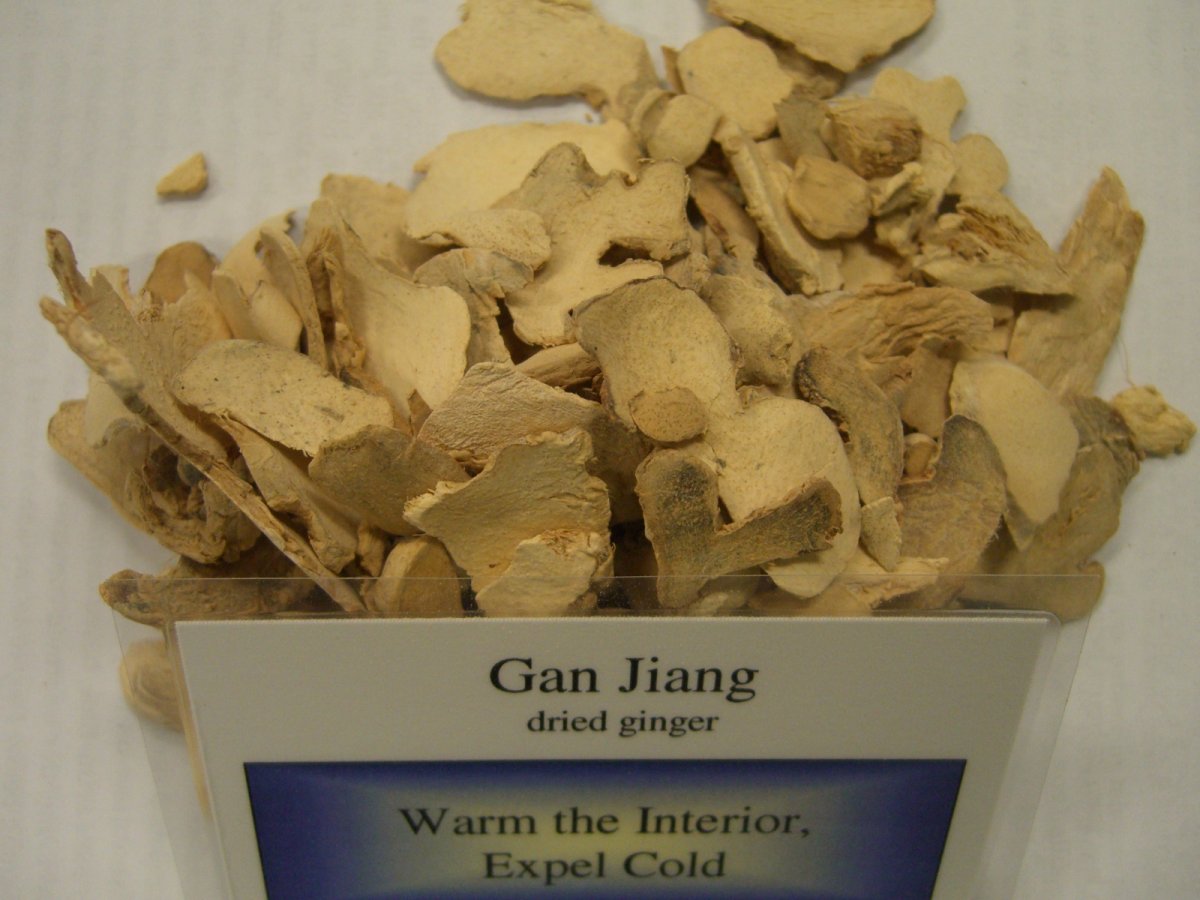Gan Jiang

  | Gan Jiang in TCM:Explore the properties of Gan Jiang according to Chinese
Nutrition and Traditional Chinese Medicine (TCM):
Factoids:
English Name: dried ginger
Pharmacuetical Name: Rhizoma Zingiberis
Properties: acrid, hot
Temperature: hot
Channels: LU, ST, SP, HT
Flavors: pungent
Tonifies: yang
Special Properties:
disperses cold, resolves phlegm
Alternate Forms:
- Sheng jiang (fresh ginger) - It is acrid and warm. Similar but different functions to Gan Jiang. Used more for exterior-cold invasion and to relieve nausea and vomiting.
- Pao jiang (processed ginger) - Processed Ginger. It is bitter and astringent. More often used to stop bleeding due to deficient cold, and to warm the channels.
- Gan jiang (dried ginger) - Acrid and hot. It is most often used to resolve interior cold and restore normal digestive function.
- Sheng Jiang Pi (skin of ginger root) - Acrid and Cool. Promotes urination, reduces edema to treat urinary dysfunction and edema.
Actions / Indications:
- Warms middle Jiao; expels cold (epigastric and abdominal pain and coldness, nausea, vomiting, diarrhea, epigastric coldness, and abdominal coldness. The cause can be due to an exterior invasion of cold or SP yang deficiency). Combine Ren Shen with Gan Jiang and Bai Zhu (exemplar formula: Li Zhong Tang (Regulate the Middle Decoction) [6].
- Restores depleted and/or devastated yang; expels cold (yang collapse with very weak pulse and cold limbs). Especially when combined with Fu Zi. Gan Jiang enhances the effect of Fu Zi and minimizes its toxicity [6].
- Warms Lung; transforms phlegm (For cough and shortness of breath due to cold accumulation, rebellious qi rising upwards, Lung cold with cough, wheezing, asthma, profuse watery or thin white sputum). Gan jiang warms the spleen to stop damp accumulation. For accumulation of cold and fluids in the lungs combine Gan Jiang with Ma Huang, Xi Xin, and Wi Wei Zi [6]. For coughing due to rebellious qi rising up combine Gan jiang with Zao Jiao and Gui Zhi [6].
- Warms the Channels and Stops Bleeding For bleeding due to deficiency and cold characterized by blood that is dark in color and thin in consistency. Usually presents alongside cold extremities and a pale tongue. Charred Gan Jiang has been shown to help with blood in urine due to this deficiency-cold type bleeding. Also, for this diagnosis combine Gan jiang with Ren Shen, Ai Ye, and Bai Zhu. For fresh blood in the stool or profuse menstrual bleeding due to this diagnosis combine Gan Jiang with Bai Zhu. [6]
- Dispels Cold and Dampness Treats heaviness and cold type pain in the back and lower body. For this purpose, combine Gan jiang with Fu ling, Bai Zhu, and Gan Cao [6].
- Pharmacological Effects: A 10% solution of Gan Jiang has a mild effect to stimulate peristalsis, intestinal activity, and acid secretion in mice [6]. A solution of 30 mL of 10% to 50% relieved nausea and vomiting in dogs [6]. Gan jiang extracted in alcohol stimulates the central nervous system, cardiovascular system, and respiratory system in dogs [6].
Special Notes:
- "Without gan jiang, Fu Zi is not hot" (refers to mutual accentuation). "Gan Jiang stays and Fu Zi walks".
- Compare Gan Jiang with Sheng Jiang, and Pao Jiang - which have similar yet different functions.
- Gan Jiang warms SP and LU while Fu Zi warms HT yang, SP yang, and KD yang.
- For continuous diarrhea due to SP and KD Yang deficiency combine Gan Jiang with Fu Zi and Bu Gu Zhi. For chronic diarrhea damaging yin, with pus and blood, heat and cold signs mixed combine Gan jiang with Huang Lian and E jiao. [6]
- For dry heaves with vomiting of saliva due to cold accumulation in the stomach combine Gan Jiang with Ban Xia [6].
Contraindications:
- (cc: pregnancy)
- (cc: yin deficiency with heat signs, blood heat, interior heat with yin deficiency)
- (cc: reckless movement of hot blood)
Disclaimer: In accordance with our terms of service, by using this web site you agree that none of the information found on this web site constitutes medical advice. You should always consult your doctor before trying any particular food or herbal remedy to treat disease.
Folk remedies presented on this site are designed to address specifc TCM diagnoses, and are not one-size-fits-all. If you would like to learn more about Traditional Chinese Medicine (TCM) and how it relates to Chinese Nutrition, you can book in a free call with a licensed professional. There is no obligation to purchase.
[CLICK HERE for your free INITIAL CONSULTATION] |

